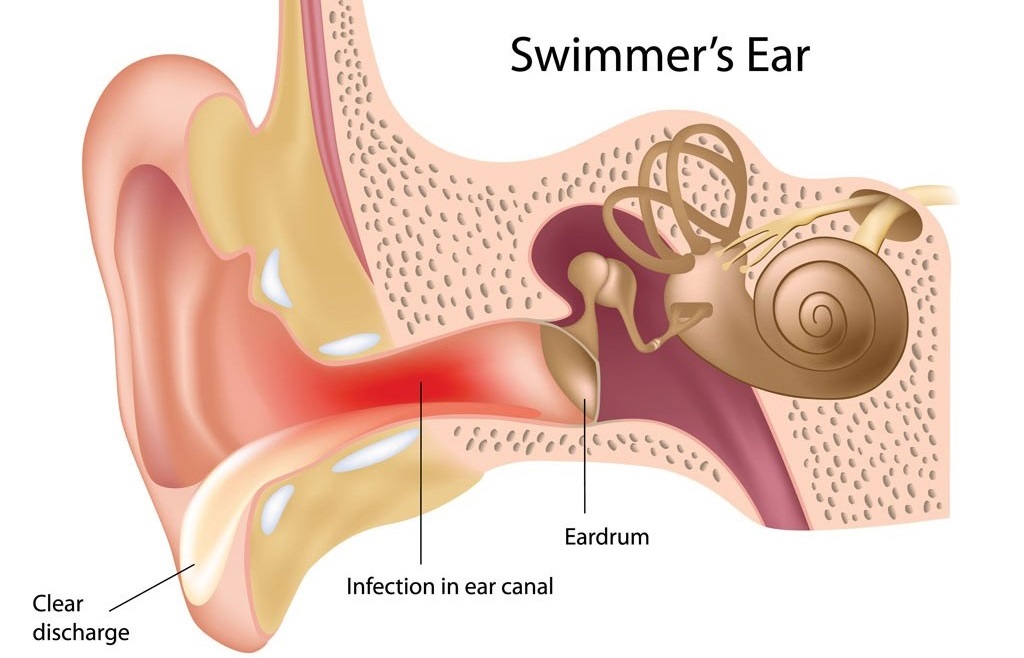Ear Infection Treatment

Pacific Specialists is home to the top otolaryngologists who specialize in the diagnosis and treatment of all ear, nose, and throat disorders, including ear infections and swimmer’s ear. If you are experiencing any of the symptoms listed below, you may have an ear infection. Our board-certified otolaryngologists will first diagnose your condition and then suggest treatment options, which include antibiotics, ear drops, and surgery in severe cases.
What are ear infections?
Most ear infections are middle ear infections, also known as otitis media (OM). The majority of cases occur in children under age five, although they can happen in adults, especially after a cold, flu, or sinus infection. OM is the most common condition that causes pain and hearing loss in children, which is why parents often seek an ENT doctor for earache treatment.
Another type of ear infection that can occur is an outer ear infection, also known as otitis externa or “swimmer’s ear”. It is caused by excessive water in the ear.
What causes ear infections?
A middle ear infection is caused by a bacterium or virus in the middle ear. This infection often results from another illness — cold, flu or allergies — that causes congestion and swelling of the nasal passages, throat, and eustachian tubes. Ear infections are more common in children because their eustachian tubes are narrower and more horizontal, making it more difficult for the tubes to drain and more likely to get clogged.
Factors that may impact the development of middle ear infections include:
- Age – Children 6-24 months are most likely to develop ear infections
- Middle ear structure & developmental stage – When eustachian tubes and immune systems are immature, OM is more likely to develop
- Group childcare – Childcare environments often expose children to more infections and colds that can lead to ear infections
- Bottle-feeding – Bottle-feeding a child while he/she is lying down has been linked to development of middle ear infections
- Seasonal allergies – Changing seasons and high pollen counts can lead to allergic reactions that increase the chances of developing an ear infection
- Winter and cold weather – Colds and flu are more common in cold weather and when seasons change, making ear infections more likely
- Air quality – Exposure to tobacco smoke and high air pollution also increase risk
An outer ear infection (swimmer’s ear) is typically caused by bacteria that’s commonly found in water and soil.
What are the symptoms of ear infections?
Symptoms of a middle ear infection may include:
- Ear pain* (especially when lying down)
- Tugging or pulling at an ear
- Difficulty sleeping
- Difficulty hearing* or responding to sounds
- Loss of balance
- Fever of 100o F or higher
- Drainage of fluid from the ear*
- Headache
- Loss of appetite
- A child that is crying more than usual
- A child that is acting more irritable than usual
*These symptoms may indicate a middle ear infection, but they are also common signs of outer ear infections (swimmer’s ear). Symptoms of swimmer’s ear also include itching and redness in and around the ear.
Many ear infections are not severe and may clear up on their own. However, for infants and children who present with symptoms of an ear infection, it’s important to seek medical care from an ENT doctor as soon as possible.
Other ear infection signs to look for in a child include:
- Symptoms that last for more than a day
- Symptoms that develop after a cold or other upper respiratory infection
- Pain that is severe
- Symptoms that cause your infant or toddler to become sleepless or irritable
- A discharge of fluid, pus or bloody discharge from the ear
Ear Infection Treatments for Otitis Media (Middle Ear Infection)
Otitis media may be treated with therapies including:
- Applying a warm compress and taking acetaminophen to reduce pain
- If infection persists or if there is fever, Antibiotics may be prescribed
- Monitoring children for any effect on hearing or possible hearing loss
- If ear infections are chronic, surgery may be suggested
Ear Infection Treatments for Otitis Externa (Swimmer’s Ear)
External ear infections may be treated with treatments including:
- Antibiotic ear drops and possibly corticosteroids
- A surgery called debridement, only in severe cases
For more information, please call our office for an appointment with one of our ENT Surgeons – (310) 477-5558, or complete the form below.

Make an Appointment
Send us a message by filling out your details in the form below.

